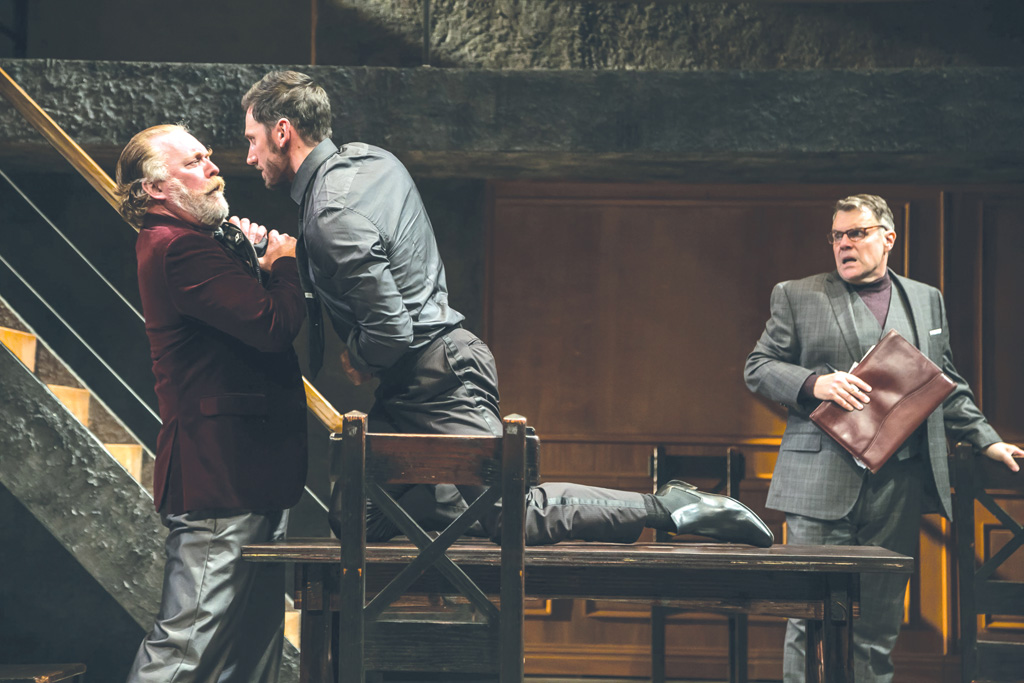A splendid production of the Bard’s story of a villainous king
By Bob Brown
From the Princeton Packet
Is Shakespeare’s “Richard III” a history play or a tragedy? It’s been treated as both, and in the current production by the Shakespeare Theatre of New Jersey, the balance shifts toward history, in line with the other “King” dramas.
Although the historical details are not strictly accurate, it helps to know something about the War of the Roses. The names and relationships in this play can be dauntingly complex. I highly recommend perusing the audience guide on the Shakespeare Theatre’s website before attending. The plot synopsis and character descriptions, as well as historical context, will give you the kind of grounding that Shakespeare’s audiences already knew. The program has a helpful Plantagenet family tree, to pinpoint exactly where Richard, Duke of Gloucester (later King Richard III) fits into the scheme of things.
And scheme it is. When you look at the tree, many of the branches were lopped off with calculated precision by this resentful, gleefully Machiavellian misanthrope on his climb to the throne. So many must de disposed of along the way.
Although it is one of Shakespeare’s longest plays, “Richard III” is nevertheless one of its least psychologically fraught. We know exactly who Richard (played by Derek Wilson) is from the opening scene. In a lengthy soliloquy, he lays it all out for us — his ill-shaped form, “cheated of feature by dissembling Nature,” has hardened his determination to “prove a villain and hate the idle pleasures of these days.”
From that moment, his character remains steady in the purpose. Through melodramatic asides, he clues us in on his deviousness. It’s fun to watch his clueless victims succumb to his honeyed charm and outrageous lies. For example, Lady Anne (Amaia Arana), who’s suffered the death of her husband, father, and father-in-law at Richard’s hand, is cajoled into marrying him. It’s an extraordinary scene where we know he’s going to dispose of her later. And yet she accepts, reluctantly.
Likewise his henchmen and would-be allies are no more secure. Lord Hastings (Ames Adamson), who is briefly brought on board with the assurances of Richard’s main hit-man, Catesby (Sheffield Chastain), soon finds himself in jeopardy when he disbelieves Richard’s accusations against Queen Elizabeth (Gretchen Hall), wife of King Edward IV. Nor will he support Richard’s aspirations for the throne. At a ghoulishly comic dinner scene, Hastings thinks he’s safe, only to be garroted and finished offstage by Catesby, his head lugged back to the table in a bag.
Hits are carried out mob style, with pistols. Indeed, costuming by Kristin Isola is in the tailored, colored-shirt-and-tie mode reminiscent of Goodfellas. When Anne emerges as Richard’s wife, she appears in a clingy gold-lamé number. After Richard slaughters his way to the crown, he trades his black attire for a muted burgundy, and his brace for a stylish cane.
Mr. Wilson’s Richard is a gleeful plotter, callously offing his brothers and dropping allies when their usefulness is spent. When co-plotter Buckingham (John Hickock) tries to cash in on the favor he was promised, Richard is annoyed and dismissive. He rarely soils his own hands in the dirty work. Even the cold-blooded Catesby has a pang of conscience after smothering young Prince Edward and his brother the Duke of York (Ben Hajek and Metin Ackay) in the tower.
The only chink in Richard’s armor is a hidden fear, revealed when the ghosts of his victims pay a nocturnal visit. The scenes in the last act are capped off by a sword fight between Richard and Richmond (Mike Magliocca) in the battle at Bosworth Field. “A horse! a horse! My kingdom for a horse!” is Richard’s most well-known line.
This splendid production, directed by Shakespeare Theatre veteran Paul Mullins, in his 25th year with the company, draws on a large cast, filling the stage at times.
Brittany Vasta’s set design is spare and generically modern, the only touch of elegance being a single chandelier that illuminates the opening scene. The soundscape by Benjamin Furiga is likewise severe — harsh percussion at dramatic moments and an undercurrent of low industrial hum at others.
As a bonus, if you come to Drew University early enough, you can view the 44th copy of the First Folio of Shakespeare’s plays. This is a rare opportunity to see this treasure, one of only a couple hundred known to exist. It’s on display until Oct. 30 in the university’s Mead Hall.
For deeply satisfying theatre, there is no substitute for Shakespeare’s rich language and dramatic plots. “Richard III” is one of the richest, and no one can do it better than the Shakespeare Theatre of New Jersey.
“Richard III” continues at the F.M. Kirby Shakespeare Theatre on the Drew University campus, 36 Madison Ave., Madison, through Nov. 6. For tickets and information, go to shakespearenj.org or call 973-408-5600.
The Princeton Packet and Greater Media Newspapers are part of the Newspaper Media Group.

